When Yasin* from IRAQ first took a Bible home, he covered the title in tape. He had to go undercover. He knew how dangerous it was for an Iraqi Muslim to own a Bible. But he was soon to take an even riskier step: deciding to become a Christian and share the gospel.
The first time Yasin read the Bible, he cried. “The first thing I read in this Bible in my own language was Matthew 5, the Sermon on the Mount,” he remembers. “I cried because of the beautiful words in it. The words of Jesus gave me peace in my heart.”
Though brought up in a Muslim home, Yasin wasn’t content in his faith. “Until I became an adult, I followed Islamic law and went to the mosque, but I was not comfortable with it,” he says. “I did not have much faith in Islam. It was a habit – but not true worship.” He prayed, asking God to reveal Himself.
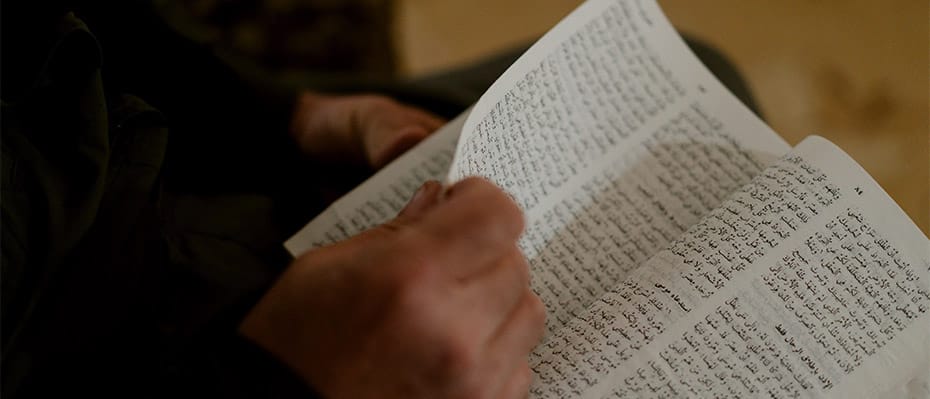
A Miraculous Dream
Eventually, an answer came in a dream. “I saw someone coming towards me,” Yasin says. “He was so beautiful. He put his hand on my head and said, ‘You are my beloved child; this is the way, follow me.’” A Christian friend said, “This is God showing Himself to you.”
Yasin met a local pastor, a convert from Islam, and read the Bible for the first time. After attending a conference by Open Doors partners, he decided to follow Christ.
Yasin’s Transformation
Yasin kept his faith secret, even from his wife, Nara*. When he finally told her, she was horrified. But he asked her, “What do you prefer – the violent man I was before, or the servant I’ve become because of my new faith?” His transformation was undeniable.
“The persecution is continuous… but there is no other way; I want to give everything to God”
Violence and Death Threats
Yasin began sharing the gospel with others. His brother, informed by a local mullah, attacked him multiple times. “He tried to kill me several times,” Yasin says. “One time, he broke my nose.” Others in the community also persecuted him. Someone even threw a firebomb at his house.
Despite the threats, Yasin’s faith remained strong. “The persecution is continuous,” he says, “but there is no other way; I want to give everything to God.”

Yasin’s family find faith
Over time, Yasin’s wife and children also chose to follow Jesus. “My daughter is a master’s student and now evangelises to people and is also preaching the gospel, like me and my son,” Yasin says. But their faith has come at a cost. The children remain unmarried due to being seen as ‘infidels’. Yasin had to close his shop and now works as a shepherd.
Still, he says, “Jesus offered Himself for me. He was insulted, He died on the cross. He did this all to redeem me. I will not deny or leave Him.”
God’s Mission
Yasin tried to leave his village, but God called him to stay. “I know God wants to use me here. I know that God has a mission for me, to bring the good news to my village.” Two people who once insulted him have now become believers and attend church with him.
*Name changed for security reasons
Back in February we TOLD the story of 16-year-old Alim* in Central Asia, who, after sharing about his faith in Jesus with friends and teachers at school, was singled out by the principal and eventually expelled. Thankfully he’s been able to continue his studies in a new school, and is as passionate as ever to share his love of God, but he’s still understandably coming to terms with his experience of persecution.
His story highlights some of the challenges facing Christians in Central Asia, and prompts us in the UK to consider our faith in a new light. And that’s just what happened to Andrew, one of our brilliant Open Doors Youth Reps. After reading his story we asked Andrew to reflect on a few questions about Alim’s experience. Here are his answers:
Why has this story resonated with you?
I think one of the main reasons is that Alim is the same age as me. And I am so, so impressed that someone so young has God-given wisdom well beyond his years along with such perseverance. I can’t imagine waking up every morning, knowing that I’d have to defend my faith, answer difficult and aggressive questions and feel threatened from every angle. And yet, through God’s power, this is what Alim has done!
FIND OUT ABOUT THE REPS PROGRAMME HERE…
How do you think Alim was feeling?
I would say that the main feeling he’d have is probably loneliness. In the moments when he’s fighting a battle seemingly on his own, I’m sure he would be asking “Where are You, God?”. And yet, he still saw that God was there. In fact, more than that, he trusted God, believing that through all the persecution, Jesus’ name would be glorified.
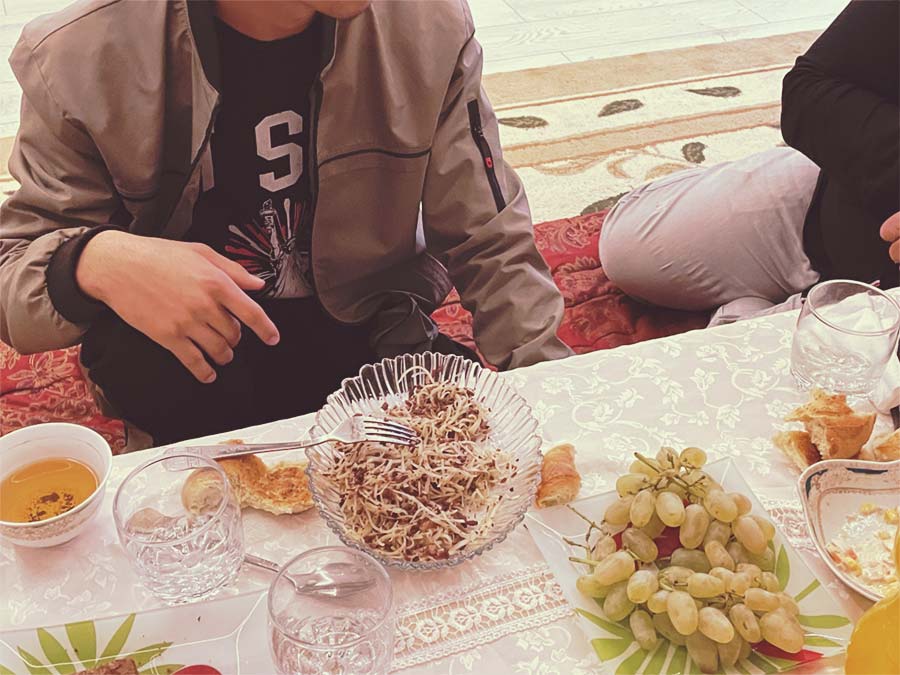
Image: Alim sharing a meal with Open Doors partners
How would you respond if you faced what Alim faced?
I would certainly question God. I would wonder why He would allow me to be in such a situation, with almost complete darkness covering me. I think my response would also be one of fear – I’d be worried that the life I had imagined was slowly slipping away. Yet I would like to think that through all of that I would still respond in prayer and faith, because while I don’t know what the full story might look like, I know that the ending will be a happy one, as God works all things for His glory and the good of those who love Him.
“I can’t imagine waking up every morning, knowing that I’d have to defend my faith, answer difficult and aggressive questions and feel threatened from every angle. And yet, through God’s power, this is what Alim has done! ”
How does their life differ from yours?
Unimaginably. I’ve met well over half of my friends through Church or SU in school. Yet Alim was completely on his own. I might face slight judgement from others for being a Christian, but it is nothing compared to what people like Alim face. I’m also certain that there are plenty of other stories just like his from Central Asia, where Christians are facing persecution for their love of God. No-one should be judged or persecuted for sharing their story and the great news of what God has done for them.
What impressed you about Alim?
I am amazed by the way that he didn’t complain when he was unfairly given extra menial tasks to do because of his faith, the same way that Christ didn’t complain when He was put on trial and tortured. He trusts that God will always make a way for him, and that everything is in His hands.
If you could say something to Alim, what would it be?
I’d encourage him with the verses in Philippians 4:6-7. “Do not be anxious about anything, but in every situation, by prayer and petition, with thanksgiving, present your requests to God. And the peace of God, which transcends all understanding, will guard your hearts and your minds in Christ Jesus.”
The message is to be strong and use the lifeline of prayer, armed with thankfulness, remembering what God has done for you already. He will guard you and get you through all the persecution and struggles that you’re facing!
FIND OUT ABOUT THE REPS PROGRAMME HERE…
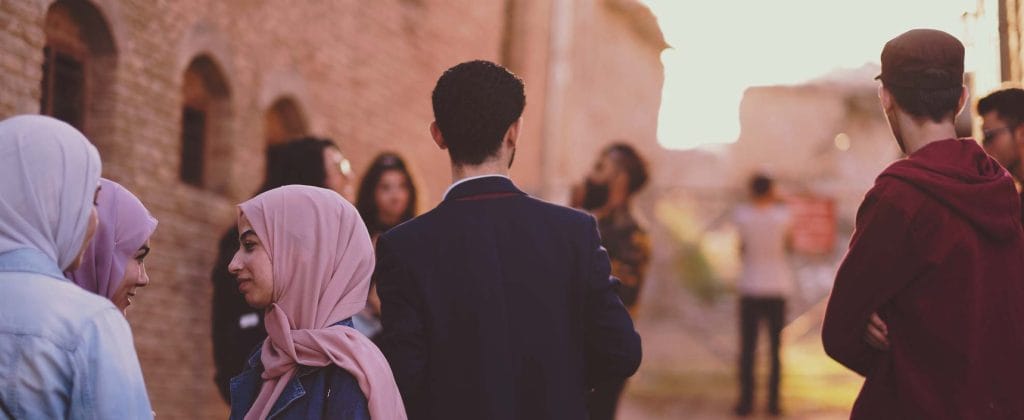
If you could ask Alim for one piece of advice, what would that be?
When it would be so easy to give up and renounce your faith, how did you manage to keep your eyes on God, following Him even during such intense pressure?
As a result of Alim’s story, would you change anything about your faith/life?
I think it is another brilliant example of what being a disciple of God means. It’s not about us being seen and recognised, but that people see we have our eyes on God. That is what Alim has been doing with even some of his teachers reaching out and asking him about his faith. I think it’s something I will try to do as well, as that is what faith should look like in our lives.
Can you share a prayer for Alim?
God, we just thank You so much for Alim – for his story of faith and endurance. We pray for those that You have touched through him, that even the hardest heart may be softened because of what You have done in Alim’s life. We pray that he feels less anxious, and that he keeps putting his faith and hope in You. We pray for him in his new college, that You will continue to bless him, and that You will create more ways for him to share Your truth. Hold on to him and be near to him we pray. In Your Name, Amen.
About Andrew
Andrew is 16 and from County Down. He’s been a youth rep since September 2024. He loves tennis, music (especially Take That), and most of all talking about Jesus!
FIND OUT ABOUT THE REPS PROGRAMME HERE…
*Name changed for security reasons
Pastor Yang* is one of many believers from Myanmar who, due to conflict and persecution, have had to flee home. He and his young family had to grab what they could and leave – not once, not twice, but many times. Most citizens face danger in Myanmar’s ongoing civil war, but the conflict is being used by those in power as an opportunity to increasingly target Christians and other minority groups.
COULD YOU WRITE TO PASTOR YANG?
Robbed at gunpoint
Pastor Yang recalls one of the attacks, by a radical group, that displaced much of his congregation. “Members of my church were blindfolded and forced to lie down as guns were pointed at them,” he says. “They were not allowed to speak. Their houses were searched for money and valuables. The radical groups took everything valuable.”
This wasn’t an isolated incident – the church members were assaulted in this way several times. Pastor Yang’s own home was targeted: “They took my motorbike and stole 150,000 kyats, which was our emergency fund.” That’s worth about £55, which is two months’ minimum wage in Myanmar. “As a result of these attacks, many church members chose to flee from the village.”
Relentless displacement
Pastor Yang and his family are never able to feel truly at home. They are always exhausted and scared, and the displacements are relentless. “We moved to another, safer place. We stayed there for a week. There also problems arose,” he says. “Then we fled to the village where my in-laws live. We stayed there for two months. We had lots of trouble there too – we moved again.”
“We have had to live amidst the sounds of gunfire and bomb explosions. All this deeply traumatises my wife. My children fear the loud noises. As a husband and a father, sometimes I feel helpless that I cannot make my own family feel safe.”

CHRISTIANS FACE A FAR GREATER THREAT
The threat doesn’t just come from these radical groups. The situation in Myanmar is very complex. Ever since the military coup in 2021, which deposed the government, widespread fighting continues in various parts of the country.
All Burmese people are vulnerable, but Christians face a far greater threat in the Buddhist-majority country. Christianity is often portrayed as a ‘foreign’ religion, and believers experience opposition from all levels of society – and from both sides in this conflict.
“Even before the coup, we Christians had few privileges,” Pastor Yang explains. “We faced many hindrances when we tried to conduct worship services and church activities.” After the coup, this discrimination turned deadly, as military airstrikes often target churches and majority-Christian areas.
Even while living in displacement, believers continue to face discrimination. When aid is distributed, Christians are denied the much-needed food and other essentials that are given to displaced Buddhist people.
“We remember God for small things, because we could be killed at any moment. I pray, ‘God, help me come back home safely so that I can see my wife and children.’”
God’s Guidance
Despite all they are facing, Pastor Yang and his family can see certainty in God’s guidance. “Living in the conflict area and going out for daily chores is stressful,” says Pastor Yang. “Every time we ride our motorbikes, we remember God’s promises in Scripture.”
He adds: “We remember God for small things, because we could be killed at any moment. I pray, ‘God, help me come back home safely so that I can see my wife and children.’”
It’s clear that Pastor Yang feels a holy responsibility to serve other displaced Christians in his region, who are also facing increased risk of persecution and discrimination. He knows that it isn’t always possible, from his own resources.
“My church members are my family members. They are my spiritual children,” he says. “Being a father in the family and a pastor in the church, it is impossible to focus only on my family’s difficulties. I cannot ignore them.”
COULD YOU WRITE TO PASTOR YANG?

Pastor Yang adds: “Our church members also left their homes. I visit them on bicycle, as my motorbike was stolen. Our main problem is the lack of basic needs. Church members have no more jobs. No income. We are battered physically, mentally and spiritually.”
MEETING Open Doors partners
With your help, Open Doors local partners can help answer the prayers of believers like Pastor Yang. He first met local partners after his family’s most recent displacement, when they were feeling particularly exhausted and defeated from repeated upheavals.
“I was overjoyed to meet the Open Doors partners. They are so passionate to serve persecuted believers like me,” says Pastor Yang. “I soon partnered with them in reaching out to the displaced believers.”
Pastor Yang was able to attend persecution survival training, and he can pass on what he learned. “I now facilitate workshops for church leaders and pastors because I know, like me, they need this time of fellowship for encouragement.”
With your support, Open Doors local partners will be able to provide much-needed food to the displaced believers Pastor Yang knows. “We distribute rice, cooking oil and onions to the most needy ones,” he says. “They cry out of joy. When we had much, we were not mindful of it – but when we have nothing, even one kyat [1/30th of a penny] means a lot.”
He adds: “If we don’t provide food to the Christians who are really displaced and in need, I cannot imagine what their lives would look like. The help is for physical needs, but it also helps their faith to increase.”
COULD YOU WRITE TO PASTOR YANG?
*Name changed for security reasons
On Tuesday 2 October 2012, Manga from northern Nigeria miraculously survived an attack by Boko Haram militants. In this powerful interview with John Bostock, professional footballer and founder of Ballers in God, he talks about football, how the events of that day more than 12 years ago unfolded, and the profound impact the miracle has had on his life.
We’ve been sharing Manga’s incredible story for the past few years, so it’s great that we can hear a bit more from Manga and how he’s determined to keep growing in his faith despite all he has been through.
Check out this incredible quote from Manga:
“Sometimes people encounter Jesus through teaching, church revivals or worship. But for me, it’s through hardship, trauma and pain, and the gift of life. I should’ve been dead. I’m healed totally. Many times, I’ve had the privilege of sharing this testimony to His glory.
“God’s Word encourages me so much to count it all joy, even when I face persecution. Even at the point when the knife was still on my neck, I should have felt the pain, but He took upon Himself the pain. Every day of my life I enjoy His grace, and when I wake up to see a new day, it’s a miracle for me.
“Every day I spend on earth I want to make God famous. I will not waste my time on regret, grief and anger, but on knowing God and fulfilling His works.”
Amazing. Enjoy the interview – it’s a long one, but really inspiring and powerful! And please pray for Manga using the points below.
North African society is predominantly Muslim, and families CAN often turn on those who reject their traditional beliefs. When Batoul* chose as a girl to follow Jesus, her mother and sisters turned on her – but she’s found the strength to continue in her faith through her church community.
It was Batoul’s* father who introduced her to Jesus. Once a fundamentalist Muslim, his transformation after becoming a Christian was clear for all to see. “After his conversion, my father changed a lot,” Batoul says. “He became kind and stopped forcing us to dress in a specific way.”
Batoul was thrilled, but her mother and sisters were not. “My mother was grateful for her new, loving husband,” she explains, “but, like my sisters, she couldn’t accept his conversion and the idea of him becoming an infidel.”
Batoul grew close to her father went to Bible Study groups with him. She learned about Jesus and was baptised at 16. “I chose Jesus, not fully knowing what to expect, but I was convinced that life with Jesus is worth all the sacrifices,” she says.
Closeness replaced with cruelty
She assumed her conversion would mean little to her mother and sisters – but she was wrong. “To my misfortune, I paid the price for both my father’s conversion and my own. They didn’t dare to persecute my father, so they turned on me.”
Her mother, Amina*, kept her away from church. Her sisters beat her and asked how much money she’d accepted to convert. “What price did they pay for your betrayal?” they demanded.

At dinner times, they forced Batoul to eat by herself. “In my culture, we eat from the same plate, so I felt like an animal eating alone. That was their intention. It was very hard for me to see my own mother – who should have been tender and close to me – instead persecuting me alongside my sisters.”
Rather than rushing to her defence, Batoul’s father distanced himself from the situation. Instead he entrusted Batoul into the care to a church leader.
Batoul felt utterly abandoned. “I had no family, I had nothing, and my faith was shaken… I only saw that the people who were with me gave up on me.”
“ I felt Christ changing me when I reached that period where I forgave every person that hurt me or did injustice in my life.”
A new family
Thankfully, God was not finished with Batoul and brought her to the attention of an Open Doors partner, Brother Youssef*. “He strengthened me, reminding me to look up to Christ and remember how He was persecuted, crucified, beaten and endured great suffering,” says Batoul. “As His followers, we, too, will face such trials… I should turn to Christ for everything I needed to do in my life, and to identify in Christ all the people I require in my life.”
She also began to attend Brother Youssef’s secret house church, a congregation made up mostly of converts from Islam: “Church is the family I was seeking since I came to believe. I felt Christ changing me when I reached that period where I forgave every person that hurt me or did injustice in my life.”
‘IT’S THROUGH PRAYER I CAN GET THROUGH THIS’
Batoul’s relationship with her mother and sisters is better now, although they still ask her to convert back to Islam. Today, with the support of Open Doors partners, she reaches out to isolated Christian girls and women in similar situations.
“I am preaching to the world outside, I get in contact with the girls,” she says. “A lot of girls are afraid of their families and their societies. That’s why they are afraid of believing! I pray that the Lord would strengthen them, that they would believe in Him, and that they would not be afraid but encouraged.”
In these strict Islamic cultures, unmarried woman and girls face extra scrutiny. “A lot of girls can’t go to church because their families don’t allow the girl to go out unless accompanied by the whole family.”
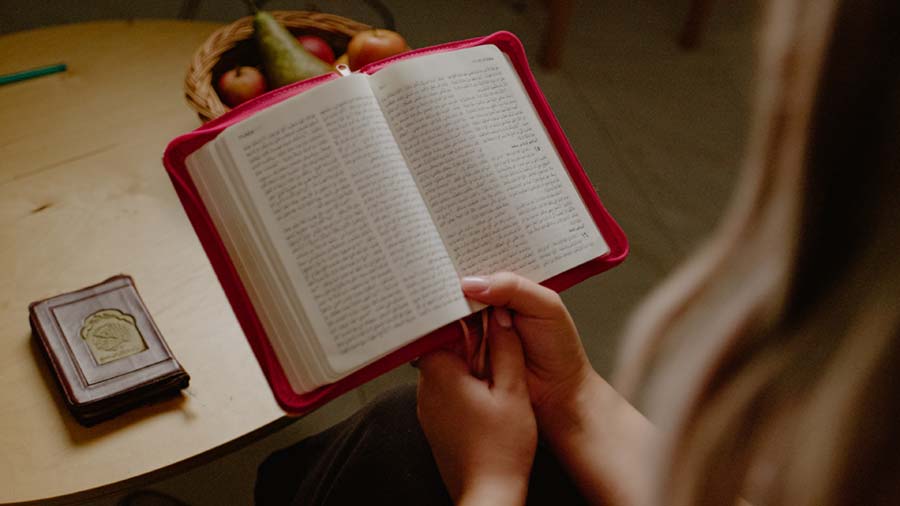
Even with the ongoing challenges, Batoul is prepared. “Because I believe in Christ, I must be ready for persecution and whatever else I might face,” she says. “I draw my strength from the Scriptures and believe in His teachings… I should reach out to others with His message. Even when they persecute and beat me, I still treat them with kindness.”
Batoul is also encouraged by your continued prayers. “I don’t feel lonely,” Batoul says, “but sometimes I still feel the pain! It’s through prayer that I can get through this. In all the sadness, I behold Christ in my life because when I remember that He’s with me, I feel joyous.”
*Names changed for security reasons. Images are representative and not of Batoul.
Zahra from Yemen has witnessed God move amidst persecution – and it’s made her bolder!
The text messages will be forever etched into Zahra’s* mind. They were sent to her friend, Anis*, after she walked down a street with him and his son. “We wanted to kill you today, but we saw you walking with others,” they said. “We don’t want to harm them, but we’re coming for you.” A week later, Anis was killed.
For Zahra, threats were nothing new, and that’s why she brushed off the messages. Yemen is one of the most dangerous countries in the world to be a Christian. Despite this, Zahra and Anis bravely discipled other believers, even when extremists took over their town and the threats began.
“I was shocked,” says Zahra, recalling the moment she learned of Anis’ tragic death. “I was haunted by the messages he had shown me a week earlier. I was terrified. What if I was next?”
A bold witness
Growing up, Zahra navigated a complex journey between two worlds: her personal faith in Jesus, which she learnt from her father, and conformity to Yemen’s deeply Islamic culture. As her faith emerged in school, she was called kafira, meaning ‘infidel’, and after an Iman made the family’s faith public, her father often had to stay away from home for the family’s safety.

Throughout these challenges, Zahra’s faith grew stronger – and so did her witness. Today, she’s one of a handful of Christians reaching out to women in Yemen, using her experiences to connect with them whilst understanding the grave risks they may encounter by following Jesus, including house arrest as families seek to preserve their ‘honour’.
And of course, Zahra faces her own dangers. “We’re afraid of the extremists and the government as, at this point, they all work together against Christians,” she says. Spies are a constant threat. “I know that, when I enter a house, I might not come back out. We live among wolves.
“I visit women in their homes, help them with housework, cook with them and spend time with them,” she explains. “Through these visits, I can build relationships to be able to lead them to Christ. I need to hear God’s voice in my daily decisions. Shall I go to this meeting today? Or shall we postpone? Maybe we should move our meeting to Zoom this week. These are questions I ask God. We need constant sensitivity to hear His words.”
“We’re afraid of the extremists and the government as, at this point, they all work together against Christians.”
Galvanised by growth
Zahra can feel fearful, but she is undeterred – because she is witnessing the Holy Spirit move. “I’m comforted and encouraged when I see how the church in Yemen, though in secret, is growing!” she says.
You’re playing a crucial role in this, through support for initiatives run by Open Doors local partners. Zahra is enrolled in one of these: a two-year leadership programme. “The skill set I’m building will help me serve the Yemeni women better,” she explains. “I’m determined to stay, despite the risks to my comfort and safety, because I believe everyone deserves to hear about God’s love.”
*Name changed for security reasons
Joo Min fled North Korea – and found Jesus at an Open Doors safe house. What would make her go back to the darkest place ON EARTH to be a Christian?
It wasn’t the first time that Joo Min* had crossed the border between North Korea and the neighbouring country. She knew that the river was deep and treacherous. Guards patrolled the riverbank, holding machine guns. If anybody discovered her, she’d be arrested and hauled to a North Korean labour camp, where conditions are unimaginably bad.
Last time Joo Min made this dangerous journey, she was escaping starvation and an oppressive regime in North Korea.
This time, she was choosing to go back.
A North Korean childhood
Growing up in North Korea, Joo Min was taught that she lived in the greatest country in the world, and that the ruling Kim family were to be gratefully obeyed and even worshipped.
She did hear about Christians – and how they were to be feared. “I was told to stay away from missionaries,” she remembers. “They said missionaries were like wolves pretending to be sheep.” Her school textbook said the same thing, telling stories of American spies pretending to be missionaries. These spies – so the textbook claimed – were sent to North Korea to kidnap children and sell them into slavery.
Severe food shortages
Despite what she was taught about life being wonderful in North Korea, Joo Min’s actual experience didn’t match up. Her family was desperately short of food so Joo Min was told to find work to help the family buy food. Like many others, she decided the cross the border to China to help raise money.
Joo Min was one of tens of thousands of North Koreans who crossed the border looking for sources of food and income. While it’s illegal for North Koreans to leave the country, the authorities are less vigilant in stopping them during periods of severe food insecurity. If Joo Min had been caught, the punishment would have been dire – but the border crossing wasn’t as heavily guarded as it is at other times.

Hearing the gospel
At first, after reaching the other side of the river, Joo Min met someone who said they could help her, and take her to a safe place. Unknowingly, she had met the first Christian she’d ever known. She’d met a secret Open Doors fieldworker.
The fieldworker took Joo Min to one of the safe houses for North Korean refugees run by Open Doors underground networks, where she found herself part of a community of people who’d made the same difficult journey as her. At the safe houses, these local fieldworkers provide food and help people find jobs. More than that – they tell people about Jesus.
“In the safe house, I heard the gospel for the first time,” says Joo Min. At first, she was very resistant. Not only had her schooling taught her that Christians were evil – she knew what she’d face if she were discovered and deported back to North Korea. If you’re found even to have met a Christian while outside the country, you are targeted for particularly harsh punishments.
“I felt like God was telling me: ‘Go back to North Korea. I felt a calling to share everything I’ve learned in my homeland.”
“Go back to North Korea”
Even with the extreme risks, Joo Min couldn’t help wanting to know more about Jesus. The Christians she met were kind, loving and offered her help without asking anything in return. “Despite what I was told as a child, I accepted Jesus as my Saviour,” she says. “I started attending Bible studies and training every week.” Eventually, Joo Min chose to be baptised.
After a long period of biblical teaching and persecution survival training from Open Doors fieldworkers, Joo Min felt the prompting of the Holy Spirit. She knew God had a plan for her – and it would require extraordinary courage.
“I felt like God was telling me: ‘Go back to North Korea,’” she says. “I felt a calling to share everything I’ve learned in my homeland.”

Smuggling light
Today, Joo Min is still serving as a leader in the underground church. “I know the risks involved,” she says. “If I am caught, I could end up in a labour camp, paying a heavy price for being a Christian now.” Yet, by the power of the Holy Spirit and with the help of the training she received from Open Doors fieldworkers, she continues her ministry.
The light she found in the safe house is what she now smuggles into North Korea and nothing – not food shortages, the danger of imprisonment, or even the seemingly all-powerful Kim dynasty – can stop the light from shining brightly in the darkness. “Please pray for me,” she asks. “Pray for protection and courage, so that I can be like salt and light in a land overshadowed by darkness.”
*Joo Min’s story is taken from accounts of two North Korean believers. As the real people are currently living and ministering in North Korea, some details have been combined or omitted to protect their identities.
Nine-year-old Moryom lives with her parents and older brother in a small, Muslim-majority village in Bangladesh. Her mother teaches Sunday school and leads an adult literacy class, and her father is a pastor and evangelist. Both are converts from Islam, which often means brutal persecution in this part of Bangladesh.
“I walk two kilometres to school because no one wants to take me in their rickshaw,” she says. “They mock me, saying ‘Christian’. When I go to school, I see some of my classmates on the way. Sometimes they throw bricks at me and push me.”
Mistreated at school

At school, Moryom often spends her day alone. “Most of the people in my school don’t treat me well,” she says. “Sometimes they beat me with sticks and call me ‘Christian’ as an insult. My classmates don’t allow me to play with them.”
Her teachers turn a blind eye to the bullying. On one occasion, another child pushed Moryom off the roof of a one-storey building while shouting “You are a Christian!”, but the teachers did nothing. “I didn’t want to go to school anymore,” Moryom says. “I got very angry but still asked Jesus to forgive them.”
Even at home, Moryom has been targeted. Some Muslim women once tried to convert her to Islam by offering her chocolate and asking her to recite the Shahada, an Islamic creed, but her parents chased them off.
“I will tell children about Jesus”

The one safe place Moryom and her family have is their church. Here, Moryom isn’t alone, and she can worship Jesus openly. “I really like Sunday school,” she says. “We sing songs, dance and pray together. We also read from the children’s Bible.”
This children’s Bible was provided by local Open Doors partners, thanks to your prayers and gifts. With it, Moryom has memorised many psalms and lots of other Bible verses. The partners also support an annual Christmas gathering for Bangladeshi Christians and their children. “We have lots of fun,” Moryom says. “I like it when we all come together. It’s a lot of fun to celebrate Jesus’s birth by cutting a cake and eating it.”
Because Jesus died on the cross for my sins, I forgive my friends”
“Because Jesus died on the cross for my sins, I forgive my friends”
Thanks to you, Moryom’s faith remains strong. “Because Jesus died on the cross for my sins, I forgive my friends. Those who mistreat me, insult me, hate me, or don’t love me, I forgive them all.”
“I want to be a teacher,” she adds. “When I become a teacher, I will tell all the children about Jesus. This is my dream.”
HELP YOUNG PEOPLE LIKE MORYOM. HOLD A ‘NOT ALONE CHRISTMAS PARTY’!
Use our free Not Alone Christmas Party outline and spend a festive evening with your youth group, friends or church, playing games, enjoying food and treats and praying that young Christians around the world would know they are not alone.
By selling tickets for just a couple of pounds, could you raise £69?
This would be enough money to send a young person like Moryom to a special, three-day gathering where she can safely celebrate Christmas with other young persecuted Christians.
Your party could fund another party, helping young persecuted Christians know they are not alone!
Get the free Not Alone Christmas Party Outline here…
Rumana starts her day like many other young people around the world, setting off on her journey to school. But she walks the mile to HER CLASSES on her own. And when she gets to school, no one says hello or sits near HER in class. She’s surrounded by people at school, but she’s also completely alone. All because she’s a Christian.
ALONE AT SCHOOL
In Rumana’s village in north west Bangladesh, almost everyone is Muslim. When her family decided to follow Jesus, the community turned against them. Even people who don’t hate Christians are reluctant to associate with the family, because it could mean they are also rejected by the other villagers.
“I don’t have any friends in school because I’m a Christian and my parents are also Christian,” she says. “If I sit with them, their parents scold them saying, ‘She is a Christian. You can’t mingle with them because Christians are bad.’ When the children say something unkind, I just keep smiling. But I cry when I’m alone.”
You might think that Rumana’s teachers stick up for her, but sadly the opposite is true. She explains, “My teachers scold children if they sit with me, saying, ‘Don’t mingle with the Christian. If you mingle with her, you might also become a Christian.’”
Rumana’s remarkable faith
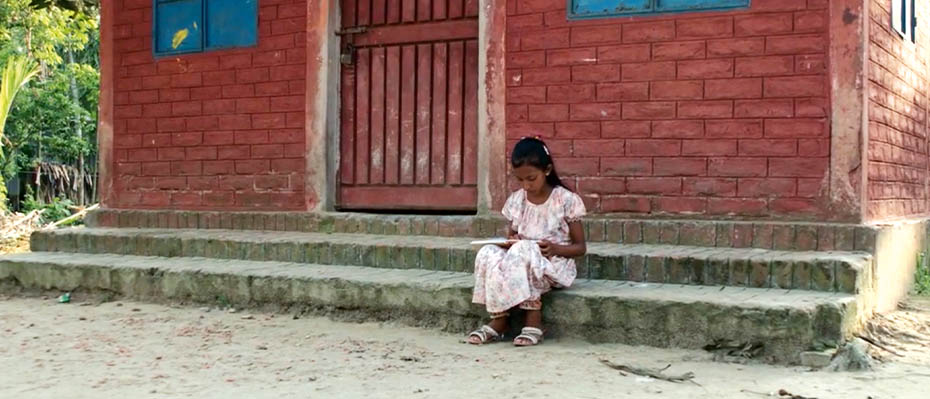
Rumana has also faced persecution from the village children while walking to church. They mock her, throw stones at her and slap her. But Rumana shows a remarkable generosity and forgiveness to the children who torment her. She says, “I told God everything so I feel better. Why should I be angry at them? I forgive them. I pray to God every day for them.”
Rumana’s faith and dependence on God are so strong. Her favourite Bible verse is Joshua 1:9: “Be strong and courageous. Do not be afraid; do not be discouraged, for the Lord your God will be you wherever you go.” As she says, “It relates to my life story. I will not be fearful of my classmates. I will be courageous.”
PERSECUTION AT HOME
Rumana was walking home from school when she saw something was seriously wrong. There was a thick cloud of smoke in the sky – and she realised it was coming from her home. It was on fire.
“The fire was massive. There was nothing left from our house. It had all gone,” she remembers with sorrow. “No one from our village offered to help. All of them were just watching.”
“No one allowed us to stay,” Rumana says. “With nothing to wear and no food, we were utterly helpless. We were all crying.”
Eventually, one neighbour took pity and let them stay a few days, but after a short while, the neighbour asked them to leave: she, like others, feared being rejected by the community for helping the Christian family. Rumana’s parents built a shed in the grounds of their destroyed house and had to live there until Open Doors partners came to help rebuild their home.
A special Christmas
This brutal rejection, bullying and discrimination is hard every day for Rumana, but the isolation can feel worst of all at Christmas. Rumana knows it’s a special time for Christians to remember the birth of Jesus, and she loves spending it with other Christian children.
With the help and prayers of people like you, Open Doors partners can host a special, three-day Christmas celebration for Christians from a Muslim background from across Bangladesh – like Rumana.
“It’s only because of Jesus’ love that I have survived until now, despite all the persecution. His love has guided me this far, and I know I am on the right path through His love.”
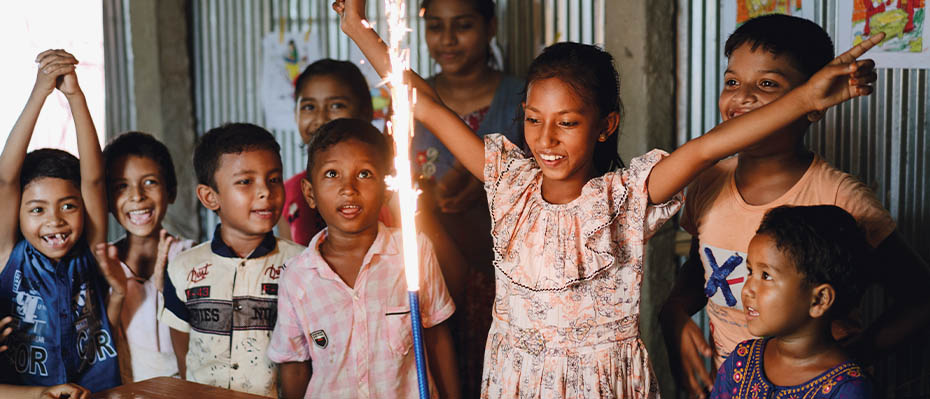
Rumana’s joy
It’s not just a time when children like Rumana can celebrate the birth of Christ safely and joyfully, though that is so important – it’s also a time when she can meet and play with lots of other young believers who understand what her life is like. They share a deep knowledge of being a young, persecuted Christian, and can support and encourage one another. Open Doors provides a regular Sunday school that she can travel to, meeting children scattered in different villages across her region – but this Christmas celebration is something even more special, with a much wider community.
“I love to celebrate Christmas because all the Christians gather around together singing songs and reading from the Bible,” says Rumana. “Sometimes we read from a storybook. We recite the Bible verses we learned from Sunday school.”
They cut and eat a birthday cake for Jesus and share a special meal. At the end of the time together, each family gets a Christmas gift from Open Doors partners. These partners help in many practical ways – but the greatest gifts that children like Rumana receive are community, encouragement and love.
“Jesus loves me,” she says. “I’m very valuable to Jesus. It’s only because of Jesus’ love that I have survived until now, despite all the persecution. His love has guided me this far, and I know I am on the right path through His love.”
HELP YOUNG PEOPLE LIKE RUMANA. HOLD A ‘NOT ALONE CHRISTMAS PARTY’!
Use our free Not Alone Christmas Party outline and spend a festive evening with your youth group, friends or church, learning more about Rumana’s story, playing games, enjoying food and treats and praying that young Christians around the world would know they are not alone.
By selling tickets for just a couple of pounds, could you raise £69?
This would be enough money to send a young person like Rumana to a special, three-day gathering where she can safely celebrate Christmas with other young persecuted Christians.
Your party could fund another party, helping young persecuted Christians know they are not alone!
